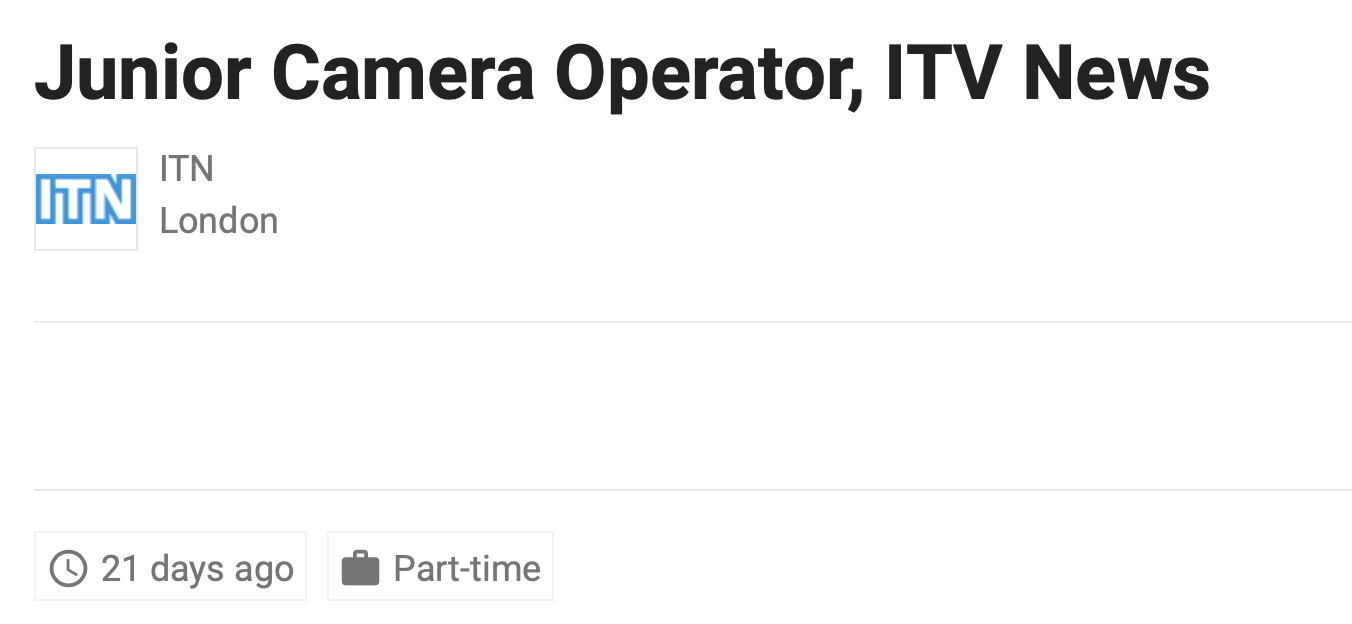Job One
DOMU – BRANDS – Camera Operator – Successful eCommerce Company – Domu Brands Manchester, NW
Highlights:
Location – Stratford, Manchester, NW
Job type/Contract – Full time, permanent
Posted – 15 Days ago
Industries – Retail
Are you a Camera Operator with a passion for creating content that resonates on an emotional level? Want to learn, grow and progress your career with an innovative business? If so, read on.
About The Company:
With a global network spanning Europe, the US and China, Domu Brands is an eCommerce company.
Part of the business focuses on creating the designs, photography, videos and marketing strategy for all our brands and products. We work with a broad range of brands, so no two days are ever the same.
As part of Domu Brands’ growth and vision for the future, we’re opening a production studio at a new site in Stretford and are looking for a Camera Operator to join our team.
The Benefits:
– Salary of £18,000 – £22,000
– Great support to help you achieve your ambitions
– Regular company social events
– Full in-house training to bring you up to speed
As a multi award-winning business, we understand the importance of keeping our employees happy and engaged. We foster a welcoming and sociable culture where new ideas are actively encouraged, collaboration is the norm and all employees are supported to fulfil their potential.
The Role:
As a Camera Operator, you will help to create engaging video content for a broad range of brands.
Joining a vibrant and fast-paced environment, you will:
– Bring great ideas into production with creativity and flair
– Effectively light a scene and operate your camera in the best way to deliver the Director’s creative vision
– Collaborate with colleagues to resolve any issues
About You:
To be considered, you’ll need:
– Experience with large sensor, interchangeable lens cameras and other filming equipment
– Previous experience with lighting and sound recording
– Knowledge of camera operation, exposure and operating grip equipment
– The ability to prepare and operate a Sony FS7 camera and all its equipment, reading and interpreting scripts into engaging videos
– Excellent communication skills and a great eye for detail
Ideally, you’ll have experience and/or a degree level qualification in video production, but this is not essential, as full training will be provided.
Other companies may call this role Camera Operator, Junior Videographer, Cameraman, Camerawoman, Media Production Assistant, Video Producer, Digital Photographer, Video Editor, Film Maker or Media Assistant.
Domu Brands is an equal opportunities employer, is 100% committed to creating jobs within the UK, and really values a diverse workforce.
So, if you’re seeking your next challenge as a Camera Operator, please apply via the button shown. This vacancy is being advertised by Webrecruit. The services advertised by Webrecruit are those of an Employment Agency.
Job Three
Freelance Camera Operator
GetFilm – Glasgow
£7.50 – £15.00 an hour – Contract
Join the Get Film family
Get Film is expanding rapidly across a number of locations in the UK. We are looking for bright, creative and talented filmmakers and editors to join our growing company.
Work with big brands
Our clients include Lloyds Bank, Accenture, EDF Energy, Hilton Hotels & Virgin Money. You will get the opportunity to work with these companies each month and build up your CV credentials.
The local area, no commute & flexible working.
We strive for ultimate flexibility, so you’ll only service your local area. No surprise trips and no long distance commitments! You control the hours you work and the jobs you want to take!
Training
We strive to improve the quality of our filmmakers and every three months offer training so that you are constantly up to date with new techniques and industry standards.
Additional Info
- You must have access to your own film making equipment.
- Please include a show-reel with your application.
Job Type: Part-time
Salary: £7.50 to £15.00 /hour
Job Type: Contract
Job Two
Freelance Camera Operator
Andrei Weddings – London W11
£100 – £350 a day – Commission
Job Summary
We are looking for young and talented camera operators with their own equipment based in and around London. Experience is operating the camera is essential. Knowledge of FCPX and sound equipment are desirable however not a must. Working for Andrei Weddings is ideal for a full time film student as they can get hands on experience while earning money. Wedding videography and event filming are very intense jobs that help you be more straightforward in your creative process.
We regularly have corporate projects and music videos.
Job Type / Category
The event filming and corporate filming industries are quite different from a professional movie set however you have more creative responsibility and are yourself the one who delivers the end product.
Required Education, Skills and Qualifications
You need to have at least 2 years of experience as a freelance camera operator.
Ideally you must have studied Film Production or a similar course although this is not mandatory.
Benefits
The benefits include but are not restricted to:
getting hands on experience with our equipment including drones, steady cams, cranes etc.
being selected to shoot our corporate projects
Job Type: Commission
Salary: £100.00 to £350.00 /day
Experience:
- Camera Operator: 2 years (Required)
Education:
- Bachelor’s (Preferred)
Get gov website about what you have to do if you work freelance such as becoming a sole trader.







